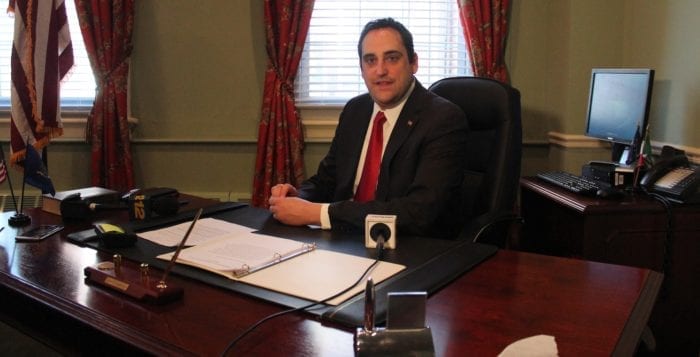New law to places limit of three consecutive terms, or 12 years, in office
By Sara-Megan Walsh
No sooner had the era of former Huntington Supervisor Frank Petrone ended that its residents were guaranteed a 24-year reign cannot happen again.
Town of Huntington board voted 4-1 to approve term limits for all elected officials Jan. 23.
The legislation, proposed by Councilman Gene Cook (R), limits the offices of town supervisor, town council, town clerk, receiver of taxes and the superintendent of highways to three consecutive terms, or a total of 12 years in office.
“The town is going to be much better off,” Cook said. “Elected officials have an upper hand and can be there forever. Now, we’ve sort of evened the field today. It took a long time, far too long, but I’m glad it’s done.”
The councilman has been working to enact term limits on Huntington’s elected officials since June 2017, when he publicly solicited and polled residents for their opinions regarding term limits before scheduling the issue for a public hearing in August 2017.
The controversy of his legislation has been the inclusion of two non-policy-making positions, the position of town clerk and receiver of taxes. Town Clerk Jo-Ann Raia (D) publicly spoke against it Tuesday night.
“I fail to see how term limits for all eight elected officials is a mandate,” Raia said. “Have any of you researched this proposal to determine where it is successful? Have any of you spent time in the Town Clerk’s and Tax Receiver’s office to actually see the work we do and what we are legally responsible for?”
Raia said since the public debate on term limits began, none of the town board members have stepped foot in her office or sat down with her to have a conversation about what the town clerk’s responsibilities include based on her more than 35 years of experience in office.
“My office issues 30-plus various licenses and permits,” she said. “I have to learn 15 state and town laws, and one federal law that governs the town clerk’s responsibilities. It takes years to learn the licensing procedures alone.”
Raia rallied support from dozens of town clerks across the state, who sent letters opposing term limits on town clerks and receivers of taxes to be read into the record. Among her supporters were Riverhead Town Clerk Diane Wilhelm, Islip Town Clerk Olga Murray and Brookhaven Town Clerk Donna Lent.
“Every change in town clerk, there has been a path of destruction,” Lent wrote in a letter, citing the rapid turnover in the Brookhaven town government.
Islip is the only other town government on Long Island to have placed term limits on the position of town clerk, according to Raia. It enacted term limits after a ballot referendum passed in 1994, limiting town clerks and supervisors to three 4-year terms.
Councilwoman Joan Cergol (D) was the sole vote against enacting term limits, citing her reason it shouldn’t include non-policy-making positions.
“I don’t believe in term limits for non-policy-makers because of my own experience as a technician of sorts in the [Community Development Agency] and understanding it takes a long time to master laws, policies, procedures and the details associated with that type of work,” said Cergol, the former director of Huntington’s CDA. “I don’t feel term limiting of that type is cost effective or efficient for taxpayers.”
Supervisor Chad Lupinacci (R) stood by the resolution and said he believed it was a step forward.
“I believe if we are going to institute term limits at this level of government, it should affect all of the elected officials at that level of government,” he said.
The supervisor said he does have a concern that the legislation could face a legal challenge as it was drafted to be effective starting in 2017, making it retroactive on those elected to office last November. He stated it may be amended to be effective as of 2018 or 2019.







